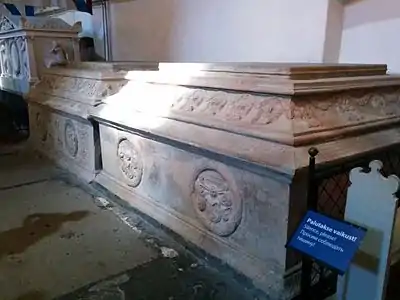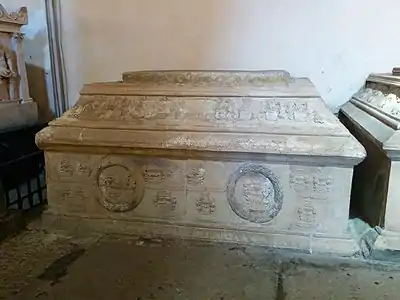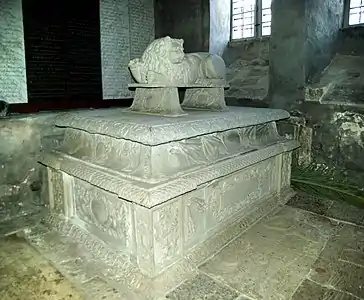Johann Gustav Stockenberg
Johan(n) Gustav Stockenberg (c. 1660 – c. 1710, Tallinn) was a Swedish sculptor, wood carver and stonemason who worked in Sweden, Russia and mainly in Reval (now Tallinn, Estonia).[3]
Johann Gustav Stockenberg | |
|---|---|
Gustav Jansson Stockenberg [1] | |
%252C_Tallin%252C_Estonia%252C_2012-08-05%252C_DD_07.JPG.webp) | |
| Born | before c. 1660 |
| Died | c. 1710 |
| Known for | Sculpture |
| Notable work | several stone sarcophagi in Saint Mary's Cathedral, Tallinn |
| Style | Baroque sculpture |
| Spouse | Magdalena Lamoureux [1] |
Life and work

Stockenberg was born in Sweden (probably in Stockholm)[1] and came to Reval (Tallinn) from Copenhagen (Denmark), where he had moved with his brother in law Abraham-César Lamoureux in 1681.[4]
He lived on St. Anthony's Hill in Reval [5] and took part in the reconstruction of Saint Mary's Cathedral after it had been severely damaged by fire in 1684.[6][7] From 1687 he was employed to work on conversions and improvements to Toompea Castle.[7][8] In August 1705 he was referred to as ″Königl. Fortifications Bild und Steinhauer″ (royal fortification's sculptor and stonemason).[9]
In 1688, he constructed the windows, doors and stairs for Maardu Manor, which brought him into conflict with the guild of masons and sculptors as he was not a member of the guild.[5]
His best known works are several stone sarcophagi that were commissioned for prominent people buried in Saint Mary's Cathedral,[10] notably the grave monuments for Otto Reinhold Taube,[11] as well as the Swedish Field Marshals Fabian von Fersen (crafted by Stockenberg at the end of the 17th century)[12] and Otto Wilhelm von Fersen.[2]
Stockenberg died in Reval.
|
Literature
- Karling, S.I. (1943), Holzschnitzerei und Tischlerkunst der Renaissance und des Barocks in Estland, Commentationes Litterarum Societatis Esthonicae, vol. 34, Tartu: Õpetatud Eesti Selts, hdl:10062/20782
- Karling, S.I. (1936), Narva: Eine Baugeschichtliche Untersuchung, Kungl. Vitterhets- historie- och antikvitets akademien. Archäologische Monographien, vol. 25, Stockholm: Wahlström & Widstrand
- Antikvariska studier III, Kungl. Vitterhets, historie och antikvitets akademiens handlingar, Stockholm: Wahlström & Widstrand, 1948
References
- Bertil Waldén [in Swedish] (1942), Nicolaes Millich och hans krets: studier i den karolinska barockens bildhuggarkonst (in Swedish), Stockholm: Saxon & Lindströms förlag, p. 162
- "monument 1367". Estonian National Registry of Cultural Monuments. Register.muinas.ee. Retrieved 2018-03-09.
- "Johan Gustav Stockenberg", Bildindex der Kunst und Architektur (in German), Marburg: Deutsches Dokumentationszentrum für Kunstgeschichte - Bildarchiv Foto Marburg, retrieved 2018-03-06
- Emil Marquard (1925), "Abraham Cæsar Lamoureux", in Østifternes historisk-topografiske selskab (ed.), Fra arkiv og museum, Serie 2 (in Danish), Copenhagen: Arnold Busck, pp. 245–247, retrieved 2019-02-28
- "EAA.1.2.483", Arhiivi infosüsteem (AIS) (in Estonian), Tallinn: Rahvusarhiiv, the National Archives of Estonia, retrieved 2023-04-21
- Mäeväli, S. (1993), Architectural and art monuments in Tallinn, Tallinn: Perioodika, ISBN 9785797904724
- Tuulse, A. (1937), "Zur Baugeschichte der Tallinner Burg", Sitzungsberichte der gelehrten estnischen Gesellschaft zu Dorpat 1935 (in German), Tartu: Gelehrte Estnische Gesellschaft, pp. 41–96, hdl:10062/21055
- "Notizen und Nachrichten", Zeitschrift für Kunstgeschichte (in German), vol. 7, Munich: Deutscher Kunstverlag GmbH, 1938, p. 360, doi:10.2307/1480964, JSTOR 1480964
- "Tallinna nööbitegijate tsunft vastusega kindlustustööde kiviraidur Stockenbergi abikaasa Magdalena Lamouree palvele lubada tal elatist teenida nööpide valmistamisega (EAA.1.2.671)", SAAGA (in Estonian), Tallinn: Rahvusarhiiv, the National Archives of Estonia, retrieved 2023-04-21
- Mäeväli, S. (1981), Historical and architectural monuments in Tallinn, Tallinn: Perioodika
- "monument 1343". Estonian National Registry of Cultural Monuments. Register.muinas.ee. Retrieved 2018-03-06.
- "monument 1344". Estonian National Registry of Cultural Monuments. Register.muinas.ee. Retrieved 2013-11-23.


